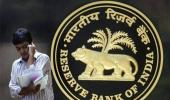Banks do extensive investigation before declaring an account fraud; they owe it to us as they deal with our money.
Why would they try to fix an innocent borrower? asks Tamal Bandyopadhyay.

What do Zoom Developers Pvt Ltd, Sterling Biotech Ltd, Kingfisher Airlines Ltd, Dewan Housing Finance Corp Ltd, Reliance Communications Ltd and Srei Infrastructure Finance Ltd have in common?
They are a few among thousands of fraud accounts on the books of Indian banks.
Different banks have attached the fraud tag to these accounts between FY2012 and FY2023.
The amount varies but the money involved in each case is at least Rs 100 crore (Rs 1 billion).
The banking industry reported 9,102 frauds involving an amount of Rs 60,389 crore (Rs 603.89 billion) in FY2022 against 7,358 frauds and Rs 1.37 trillion in FY2021 and 8,702 frauds and Rs 1.85 trillion in FY2020.
In 2019, the value of money involved in bank frauds was Rs 1.9 trillion and the number 8,700.
About 86 per cent of these cases were large-value corporate frauds worth over Rs 50 crore (Rs 500 million) each.
For the first time, the June 2017 Financial Stability Report of the Reserve Bank of India spoke about the growing volume and value of bank frauds and described it as 'one of the emerging risks to the financial sector'.
It highlighted the 'general credit governance issues' and referred to serious gaps in credit underwriting, alongside the lack of continuous monitoring of cash flows and cash profits, the diversion of funds and double financing.
At the moment, banks give an opportunity of hearing to wilful defaulters but not fraudsters.
Now, fraudsters too will get the opportunity for natural justice, but things are unlikely to change.
Who will admit to committing a fraud?
Two years later, the June 2019 Financial Stability Report blamed delayed detection for the rise in frauds and pointed out that 90.6 per cent of the frauds reported in FY2019 were related to cases that happened between 2000 and 2018.
And in December 2018, the RBI flagged frauds as the 'most serious concern' in managing risk in the Indian banking system.
Even my aunt is aware of this. Why are we talking about bank frauds? What's new about them?
In the last week of March, India's highest court held that the borrowers must be given a hearing before classifying an account as fraud.
The Supreme Court verdict relates to the RBI's 2016 circular, which allowed banks to declare wilful defaulters as fraud.
A wilful defaulter is one who has the capacity to service bank loans but does not do so. Fund diversion also makes one a wilful defaulter.
While it upholds a 2020 high court judgment, the apex court is against a unilateral declaration of fraud by banks without a hearing.
As a precondition to classify a bank defaulter as fraud, a hearing is a must to record the reasons for declaring an account as fraud.
Declaration of fraud has severe penal and civil consequences, including 'blacklisting' the borrower from accessing institutional finance.
Clearly, the objective of the judgment is to prevent banks from exercising powers arbitrarily.
This master circular, issued in 2016 under Section 35 A of the Banking Regulation Act, 1949, allowed banks to unilaterally classify accounts of wilful defaulters as fraudulent.
The point to note is that all fraud accounts are wilful defaulters but not all wilful defaulters are fraudsters.
The circular was updated a year later in July 2017.
Rajesh Agarwal, promoter of B S Ltd, engaged in power transmission and distribution, passive telecom infrastructure, renewable energy and mineral resources, challenged this in the Telangana high court.
The RBI and India's largest lender, the State Bank of India, moved the Supreme Court against the high court order.
Apart from hurting the borrowers' ability to raise fresh credit if banks use the right to declare them frauds arbitrarily (the declaration is 'tantamount to blacklisting of borrowers from accessing institutional finance'), the circular violates the principles of natural justice.
This seems to be the basis of the Supreme Court judgment even though the lenders find the circular handy for early detection of fraud.
Will this judgment dramatically change the credit landscape? Let's first take a look at the current procedure of fraud detection.
# Going by Section 447 of the Companies Act 2013, fraud includes any act of omission and commission and concealment of facts to gain undue advantage.
# The date of branding an account as a fraud account is the date on which the fraud is committed.
# The date of detection of all frauds of at least Rs 100 crore in a bank's book refers to the date of approval by the managing director or executive director of a bank after a committee of executives places it before the top management.
# The fraud monitoring group of a bank is deeply involved in the process.
The red-flagged accounts, or RFAs, are immediately uploaded on the RBI's Central Repository of Information on Large Credits, or CRILC, platform.
The banks supply data in real time for all loans of Rs 5 crore and above to CRILC, which was set up in June 2014.
For accounts turning bad, the data is weekly, while standard accounts are reported monthly.
# Six months after red-flagging the account, if there is no change in status, the fraud declaration takes place.
# Typically, banks use forensic experts as well as external auditors besides internal auditors in the process. The forensic audit is completed in three months.
(Incidentally, a Department of Financial Services [DFS] notification of the finance ministry, dated February 27, 2018, to public sector bank [PSB] chiefs says that 'all accounts exceeding Rs 50 crore, if classified as NPAs, shall simultaneously be examined by banks from the angle of possible fraud'.
The letter, carrying the subject line 'Framework for timely detection, reporting, investigation, etc. relating to large value bank frauds', says, 'In case, an account turns NPA, banks shall be required to seek a report on the borrower from CEIB (Central Economic Intelligence Bureau) and such report would be furnished by CEIB within one week of receipt of request from the bank.'
This particular letter refers to an earlier DFS letter, written on May 13, 2015, which put the 'overall responsibility for ensuring compliance' on all these criteria with the chief of a PSB.)
# Banks do file FIR against frauds. Also, they move the central investigative agency (CBI) for such cases.
# Finally, incidents of frauds are not restricted to plain-vanilla borrowing accounts -- be it retail and corporate loans. They also include cyber frauds.
The dynamics of bank fraud is changing. The number of frauds related to advances has been on a decline, while cybercrime -- card- or internet-based transactions -- is on the rise.
Of course, in terms of size, they cannot compete with corporate frauds such as the Rs 22,842 crore (Rs 228,42 billion) fraud of ABG Shipyard Ltd involving SBI and 27 other lenders and the Rs 11,400 crore (Rs 114 billion) fraud that has hit the Punjab National Bank.
At the moment, banks give the opportunity of hearing to the wilful defaulters but not to fraudsters.
Once the system of giving the fraudsters a hearing (this means, issuing a show-cause notice) is in place, things are unlikely to change.
Who will admit to committing a fraud? Banks do extensive investigation before declaring an account fraud; they owe it to us as they deal with our money. Why would they try to fix an innocent borrower?
Barring a few exceptions, the new system will, at best, delay the process, and the court cases after declaring an account fraud will continue.
Incidentally, the Supreme Court has said that a borrower need not be given an opportunity of being heard before registering an FIR.
Tamal Bandyopadhyay is a consulting editor, Business Standard and senior adviser to Jana Small Finance Bank Ltd.











